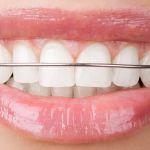Tips for Adults with Braces: Achieving a Beautiful Smile
- 1. Why Adults Get Braces
- 2. Adjusting to Life with Braces
- 3. Maintaining Good Oral Hygiene with Braces
- 4. Managing Discomfort and Pain
- 5. Diet Tips for Adults with Braces
- 6. The Importance of Regular Checkups
- 7. Real-Life Stories from Adults with Braces
- 8. Why Choose Dentistry Toothtruth for Your Braces Care
1. Why Adults Get Braces
While braces are commonly associated with teenagers, adults are increasingly seeking orthodontic treatment. The reasons can vary, ranging from wanting a more aesthetically pleasing smile to addressing issues like misalignment or bite problems. Many adults choose braces as a way to boost their confidence and improve their overall oral health. With advances in orthodontics, there are now more options available for adults that make the process more comfortable and discreet, such as clear aligners and ceramic braces.
For some adults, braces are a solution to long-standing dental issues that were never addressed in their younger years. For others, it's a proactive measure to correct bite problems, which can lead to improved function and reduced wear on the teeth. Regardless of the reason, adults with braces often find that the effort is well worth the results, both in terms of aesthetics and dental health.
2. Adjusting to Life with Braces
Adjusting to braces as an adult can take time, but with patience and the right approach, it can be a smooth process. One of the first things you may notice is that your teeth may feel sore or sensitive after getting braces, especially in the first few days. This is a normal part of the process as your teeth start to shift into their new positions.
It’s also common to feel a bit self-conscious about wearing braces, especially as an adult. However, it’s important to remember that braces are a temporary measure, and the end result—a beautiful, straight smile—is worth the investment. To make the adjustment easier, some adults opt for clear aligners or ceramic braces, which are less noticeable than traditional metal braces.
3. Maintaining Good Oral Hygiene with Braces
Maintaining good oral hygiene is critical when you have braces, as food particles and plaque can easily get trapped in the brackets and wires. If not properly cleaned, this can lead to tooth decay, gum disease, and staining. To avoid these issues, adults with braces should be especially diligent about brushing and flossing.
Brushing after every meal is essential, and it’s a good idea to use a soft-bristled toothbrush to prevent damaging the braces. Flossing with special orthodontic flossers or a water flosser can help remove debris from between the teeth and around the braces. Mouthwash can also help rinse away bacteria and keep your breath fresh.
In addition to regular brushing, it’s essential to visit your dentist regularly for cleanings and checkups to ensure your oral health stays on track while wearing braces.
4. Managing Discomfort and Pain
While wearing braces, it’s normal to experience some discomfort, particularly after adjustments. This discomfort usually lasts for a few days and can feel like a mild soreness or pressure on your teeth. Fortunately, there are several ways to manage this discomfort.
- Over-the-counter pain relievers: Nonsteroidal anti-inflammatory drugs (NSAIDs) like ibuprofen can help reduce pain and inflammation in the days following an adjustment.
- Orthodontic wax: If the brackets or wires are rubbing against the inside of your mouth, applying orthodontic wax can help soothe irritated areas.
- Cold compress: A cold compress applied to the outside of your face can reduce swelling and numb the discomfort.
Although the discomfort is temporary, it can sometimes feel overwhelming, but knowing that it will subside can help you stay focused on your goal of a healthier smile.
5. Diet Tips for Adults with Braces
Diet plays an important role in caring for your braces and your teeth. Certain foods can damage the brackets or wires, so it’s essential to avoid hard, sticky, or chewy foods that can get stuck in your braces and cause issues.
It’s also a good idea to cut up larger foods into smaller pieces to make them easier to chew. Here are a few diet tips for adults with braces:
- Avoid hard foods like nuts, hard candy, and ice that can break or loosen braces.
- Steer clear of sticky foods like caramel or chewing gum that can get stuck in your braces.
- Eat soft foods like yogurt, mashed potatoes, and smoothies, especially in the days following adjustments.
Maintaining a healthy diet not only helps protect your braces but also ensures your teeth stay strong and your gums remain healthy throughout your treatment.
6. The Importance of Regular Checkups
Regular checkups with your orthodontist are essential during your time with braces. These visits allow your orthodontist to monitor your progress and make any necessary adjustments to ensure your treatment stays on track.
In addition to monitoring the alignment of your teeth, your orthodontist will also check for any potential issues, such as gum inflammation or broken brackets. Regular checkups also provide an opportunity for you to ask questions about your treatment and discuss any concerns you may have, ensuring that you’re always informed and comfortable with the process.
7. Real-Life Stories from Adults with Braces
Many adults who choose braces have shared their stories about the journey and how it has impacted their lives. For example, Sarah, a 35-year-old professional, felt self-conscious about her smile for years but decided to take the plunge and get braces. “I was nervous about how it would affect my appearance at work, but after a few months, I started to notice the results, and my confidence grew,” Sarah says.
John, a 42-year-old father of two, was also hesitant about getting braces but was motivated by his desire to improve his oral health and smile. “I’ve always been self-conscious about my crooked teeth, but braces have not only made my smile better but have also helped with my jaw pain,” he says.
These real-life stories show that adults with braces can achieve a beautiful, healthy smile with persistence and proper care.
8. Why Choose Dentistry Toothtruth for Your Braces Care
At Dentistry Toothtruth, we understand the importance of maintaining oral health during orthodontic treatment. We offer a range of products and services designed to help you care for your braces, from orthodontic wax to specialized toothbrushes and flossers. Our expert advice and high-quality products will ensure that your braces journey is as smooth and successful as possible.
Visit Dentistry Toothtruth today to learn more about how we can support you during your braces treatment!







 Willamette Dental Group - Hillsboro4.0 (153 review)
Willamette Dental Group - Hillsboro4.0 (153 review) Ernstberger Orthodontics5.0 (326 review)
Ernstberger Orthodontics5.0 (326 review) Greater Portland Endodontics5.0 (14 review)
Greater Portland Endodontics5.0 (14 review) Dr. Grayson West, DDS5.0 (1 review)
Dr. Grayson West, DDS5.0 (1 review) Community Health Center of Snohomish County - Everett-North Clinic4.0 (960 review)
Community Health Center of Snohomish County - Everett-North Clinic4.0 (960 review) Riverside Oral Surgery4.0 (250 review)
Riverside Oral Surgery4.0 (250 review) The Importance of Oral Health Education During Pregnancy for a Healthy Pregnancy
The Importance of Oral Health Education During Pregnancy for a Healthy Pregnancy Best Tips for Brushing Your Teeth Properly for Healthy Gums: Essential Techniques for Oral Health
Best Tips for Brushing Your Teeth Properly for Healthy Gums: Essential Techniques for Oral Health Why Skipping Dental Checkups Can Lead to Bigger Oral Health Problems
Why Skipping Dental Checkups Can Lead to Bigger Oral Health Problems Advantages of Porcelain Dental Restorations
Advantages of Porcelain Dental Restorations How Can Diabetes Cause Tooth and Gum Problems? Preventing and Managing Oral Health Issues
How Can Diabetes Cause Tooth and Gum Problems? Preventing and Managing Oral Health Issues Healthy Habits for Promoting Good Oral Health and Hygiene: Tips for a Healthy Smile
Healthy Habits for Promoting Good Oral Health and Hygiene: Tips for a Healthy Smile